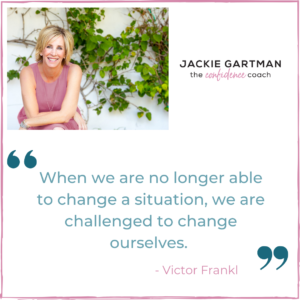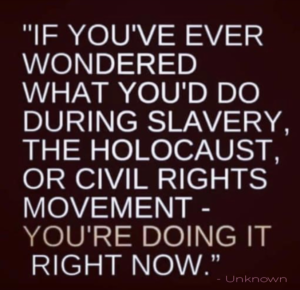 Your brain (and mine) have what’s called a “negativity bias.” That means we’re wired to be drawn toward the truly terrible, like moths to a flame, even when we know that soaking in it doesn’t help us or the situation and, in fact, causes us pain. Whether we’re glued to the news following a disaster, reading the newspaper and seething over political turmoil, or regaling our co-workers with the latest drama at home, there’s a notable and dramatic downshift in our energy levels that follows.
Your brain (and mine) have what’s called a “negativity bias.” That means we’re wired to be drawn toward the truly terrible, like moths to a flame, even when we know that soaking in it doesn’t help us or the situation and, in fact, causes us pain. Whether we’re glued to the news following a disaster, reading the newspaper and seething over political turmoil, or regaling our co-workers with the latest drama at home, there’s a notable and dramatic downshift in our energy levels that follows.
When you focus on negativity, your experience of negativity expands.
The good news is that you can overcome your brain’s negativity bias as you move through your day. How? By focusing on others instead of on your anxiety and fear. It’s said that where we put our attention, our energy follows. It follows that if you are in your head stewing about something, it’s almost impossible to connect to anything or anyone else.
Consider: You walk into a roomful of strangers. Maybe it’s a party; maybe it’s a business meeting with a new client or prospect. You feel insecure and apprehensive. You want to make a good impression and powerfully connect, but you’re so absorbed by your own self-consciousness and how to overcome it, that you freeze like a deer in the headlights, or you drink one too many cocktails and slur your way through the few painful conversations you force yourself to have. You leave feeling disoriented and embarrassed.
Or maybe you’ve moved to a new city or neighborhood and you’re having trouble making friends. Sure, you “meet” people at the gym, your kids’ soccer games, and your yoga class, but conversation remains polite and shallow. You’d ask someone out for coffee to get to know them better, and hey, maybe make a new friend, but you’re feeling nervous and don’t know how to move from the shallows to something more meaningful. You watch others, clearly friends, and feel left out and resentful.
What’s happened? Simple. Your attention is on your own discomfort, and that keeps you inwardly focused and out of the conversation. The disconnect begins with you and the emotional battles you’re having with yourself, and even when people don’t know what’s up, they still sense you’re not really there. It’s like trying to talk to people while simultaneously texting your terrible grandmother who always tears you down. You’ve been hijacked by your brain’s negativity bias.
Beginning any new relationship – or staying present in an established one – means shifting your attention from yourself to the other person.
Attention in = lost in your own experience or your brain’s self-critique
Attention out = giving those you talk to the gift of your full presence
When you put your attention out, you have no room to be self-conscious. You are, in essence, shutting the door to that negative part of your brain that tells you you’re terrible, stupid, and unworthy. It’s like locking up what neuroscientists call the “lizard brain,” the primitive and fearful part of you, much like you do when you secure your home at night, so you can relax and sleep peacefully.
When your attention is out, there is no room for your lizard to creep into your consciousness. Even the smallest amount of attention paid to the mutterings of your lizard brain can impact your ability to connect to your higher self and your inner wisdom. In addition, chances are better than good that you will lose your curiosity about others and make massive assumptions about what they are thinking about you. Your brain simply doesn’t have the resources to manage your inner lizard and try to deeply connect to others, and sadly, the lizard usually wins out.
The inspiring Kasia Urbaniak, who introduced me to the concept of Attention In and Attention Out, says that being mindful of where your attention is, and where it’s going, is key to feeling in control and at ease in any social situation. If you find yourself feeling confused, off-kilter or just want to connect more deeply, check in and ask, “Where’s my attention?”
Three Easy Steps for Putting Your Attention OUT
- Prepare your mindset. Set an intention before you get into the situation, that you are going to shift your attention to whoever is speaking to you.
- Get curious. Pretend you’re irrelevant and that the only thing that’s important to you is the person sitting across from you.
- Ask questions. Prepare these in advance if you need to, or borrow any of these sparkly conversation starters:
- What is your morning ritual?
- What’s the last book you couldn’t put down?
- What’s the best part of your day?
- Do you believe people deserve to be happy?
- Where do you lose track of time?
- If you were to die in 3 hours, what would you regret the most?
- Have you ever won a contest? An award?
- Can you tell when someone is lying? Telling the truth?
- Do you think we’re designed to be monogamous?
- What would you like to say “yes” to this year?
- Are you a starter or a finisher?
- What was your first job?
- Who was your best kiss?
- What’s the worst advice someone gave you?
- What’s the best advice you were given?
- If you could have T.V. parents, who would they be?
- It’s 20 years in the future and I only have a few minutes, what advice would you give me?




